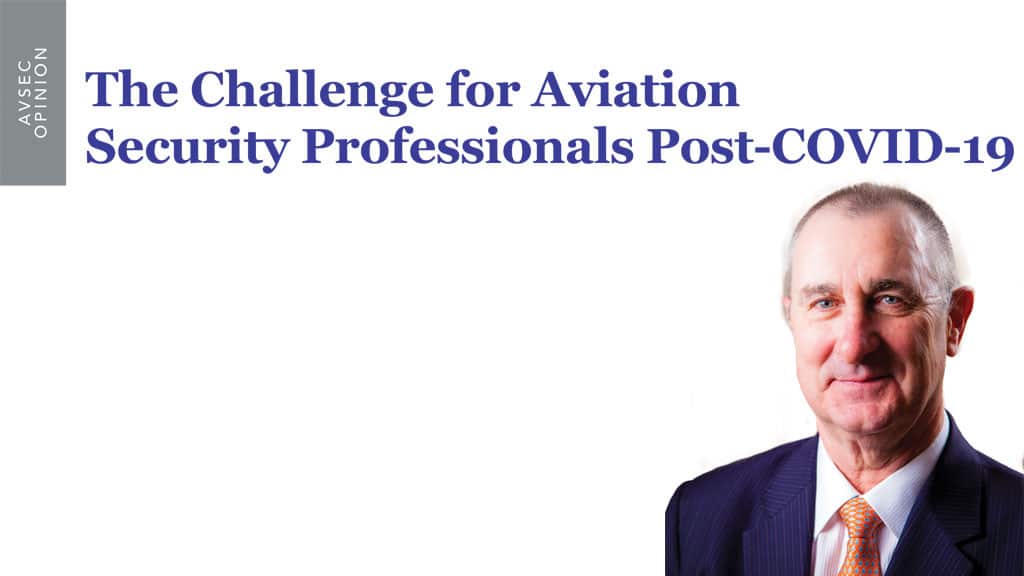On 21 March 2020, COVID-19 was officially declared to be a pandemic by the World Health Organisation, and it continues to have a catastrophic impact on different sectors of the global economy, particularly the aviation industry.
The true extent of the economic damage sustained by the wider aviation industry to date is unknown. Yes, airports and airlines have been significantly affected – but so too have associated and support businesses like ground handling, catering, cleaning, concessions and others, including security.
“…contribute to that recovery wherever possible with passion and innovative intellect…”
Globally, commercial airlines were expected to generate combined revenue of around $872 billion in 2020. However, on 14 April 2020, the International Air Transport Association (IATA) released an updated analysis showing that the COVID-19 crisis would see global airline passenger revenues drop by $314 billion in 2020, a 55% decline compared to 2019. To underscore this impact, Warren Buffet, the American investor sold his firm’s entire holdings in the four major US airlines (Delta Airlines, American Airlines, Southwest Airlines and United Airlines), warning that the “world has changed” for the aviation industry due to the crisis.
Profits across the industry are renowned for being razor-thin, and most airlines struggle to break even. Many airports have closed, or significantly reduced operations, and airlines have parked most of their fleets. Governments have been asked for financial assistance along with banks and shareholders. This is an unprecedented time for the industry.
Tens of thousands of employees have been stood down, many others have been forced to take leave without pay or asked to take significant pay cuts.
Although the aviation industry is renowned for its resilience, there will be airlines and other industry participants that, unfortunately, will not survive the year.
The focus of the wider aviation industry is now on how to restart amidst the COVID-19 pandemic. Most industry participants are exploring ways to facilitate a restart of the aviation industry in a safe and health-conscious manner that will minimise the opportunities for dissemination of the disease. A variety of new measures, processes, and procedures are already being considered or introduced around the world.
ICAO member states and representatives of the industry – including ACI World, IATA, the Civil Air Navigation Services Organization (CANSO), and the International Coordinating Council of Aerospace Industries Associations (ICCAIA) – have worked together to develop the ICAO Council Aviation Recovery Task Force Report.
The aim of the report is to assist national governments and regulators around the world in aligning the local, national, and regional recovery plans that are now being developed and implemented around the world to foster a globally harmonised recovery.
“We welcome the authoritative ICAO Council Aviation Recovery Task Force Report which will contribute to a globally-consistent, outcome-based approach to the restart and recovery of air travel,” ACI World Director General Angela Gittens said.
“Aviation is an interconnected and interdependent global ecosystem and continued global collaboration, cooperation and consistency are key, first for the industry to successfully restart, and then for sustaining a balanced recovery.”
ACI World believes there is currently no single measure that could mitigate all the risks of restarting air travel. The harmonisation of any new processes and procedures represents the most effective way of balancing risk mitigation with the need to unlock economies, and enabling travel.
IATA has also been very active in seeking expert medical advice in the development of strategies for restarting the aviation industry. This has included appointing its own medical advisor along with the Medical Advisory Group, consisting of ten airline medical directors preparing advice for its member airlines.
Mitigation strategies being considered for airlines as minimal operations resume will no doubt include body temperature screening, symptom screening, the use of masks and PPE, physical distancing, cleaning and disinfection, measures to assist contact-tracing, along with specific mitigation measures relating to crew members.
There is no vaccine available now and one is not expected to be available until at least 2021. Therefore, the industry will have to learn to live with the virus for the foreseeable future.
No one expects the industry to bounce back to January/February 2020 capacities any time soon. Some regions and countries may well start operations before others. The frequency of flights will grow slowly and non-essential flights for business and leisure travellers are unlikely to resume immediately, despite expected significant ticket discounting.
So, what does this mean for aviation security?
First and foremost, the security threat to the industry still exists. It has not gone anywhere during this pandemic.
Understandably, there will be significant pressure on the industry to cut costs as it continues to bleed money, and profits look more like a dream than an achievable reality any time soon.
The aviation security industry must also prepare for this pressure. It has an obligation to contribute to the growth and viability of the industry whilst at the same time protecting the industry, its employees, customers, and assets.
There will be requests to delay the introduction of new equipment and technologies, reduce training, close checkpoint lanes to reduce staff numbers, and other cost-saving measures.
The challenge for the aviation security professional as the industry attempts to restart is simple: be extremely cognisant of the economic position of the industry and in particular of your employer, and contribute to that recovery wherever possible with passion and innovative intellect. At the same time, be truly honest to your profession and ensure that nothing occurs under your watch that will dilute the ability of the industry to protect life.
This will be a once-in-a-career character test for all aviation security professionals.

Geoffrey D. Askew AM is Principal, Askew and Associates.
